Revealed: The Queen's favourite British cars - including a Vauxhall estate
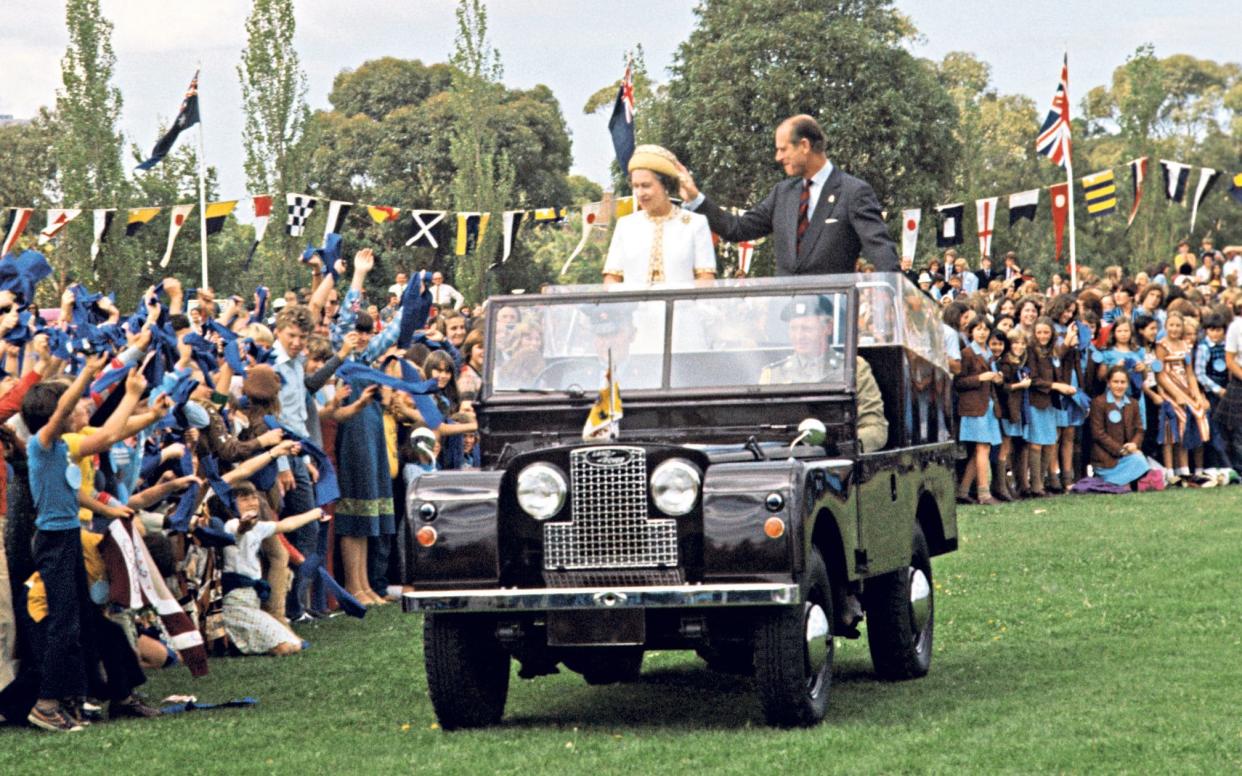
The Queen’s enduring passion for driving throughout her 70-year reign has involved an unusual collection of (mostly) regal cars that trace the history of British motoring.
Princess Elizabeth was proclaimed Queen on 6 February, 1952 – although she wasn’t crowned until 2 June, 1953 – meaning that the Platinum Jubilee celebrations commence tomorrow.
As well as the obligatory Bentleys and Rolls-Royces befitting a sovereign, Her Majesty has also chosen sometimes improbable cars to suit her needs, both as a monarch and a mother.
The Queen is the only person in the land who drives without the requirement to hold a valid licence but she is more than qualified. During the Second World War, Her Majesty was a mechanic and driver in the Women’s Auxiliary Territorial Service.
Equally at home on the back seat or behind a steering wheel, she is also uniquely placed to choose the right royal car. Whether it’s a crawl through crowds at Windsor or hacking a Land Rover Defender across the Balmoral estate, few people can match her motoring experience.
1953: Land Rover Series I
Known by the Royal household as ceremonial vehicle State IV, this rugged workhorse was one of Her Majesty’s first cars in a long association with Land Rover.
However, not even the distinctive royal claret paintwork could hide the fact that the specially adapted 86in Series I had few modern comforts.
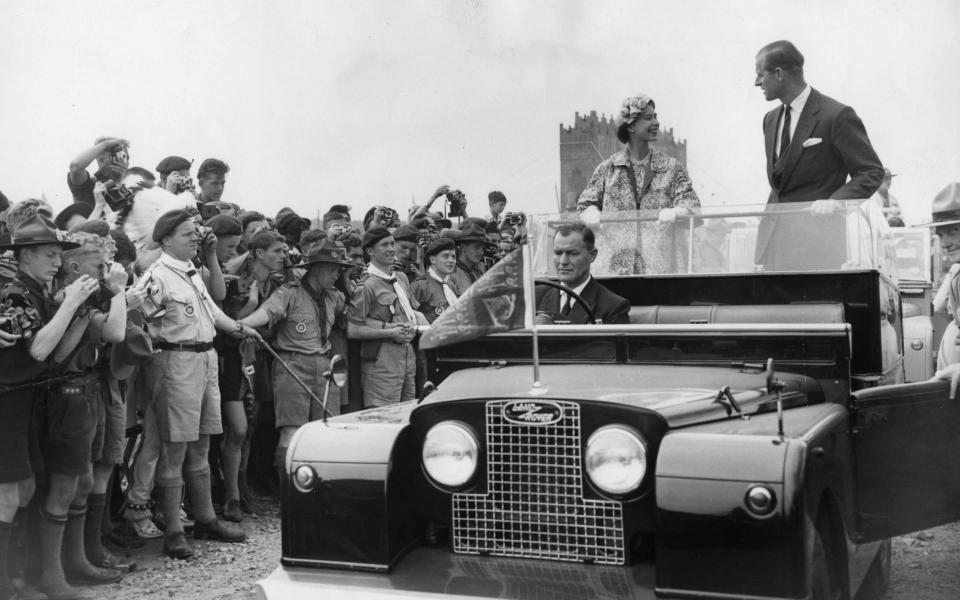
Unregistered, it was shipped around the world with six other vehicles as part of the Queen and Prince Philip’s six-month Commonwealth tour that year. The royal couple stood on a platform at the rear while a chauffeur crunched through the Land Rover’s notoriously awkward gearbox.
The Series I Land Rover lasted from 1948 until 1956, gradually superseded by a new off-roader called the Range Rover.
Daimler Empress MkII
The classic, post-war styling of this sleek four-door saloon reminds us how long the Queen has reigned – it could have been driven straight off the set of a 1950s Ealing comedy. The Daimler was one of her first cars after becoming monarch, complete with fold-down walnut tables and throne-like seats.
Daimler was already long-established as a royal favourite by the 1950s. A 3.0-litre limousine, her aptly-named Empress was one of only 33 produced, with bespoke bodywork by coachbuilder Hooper.
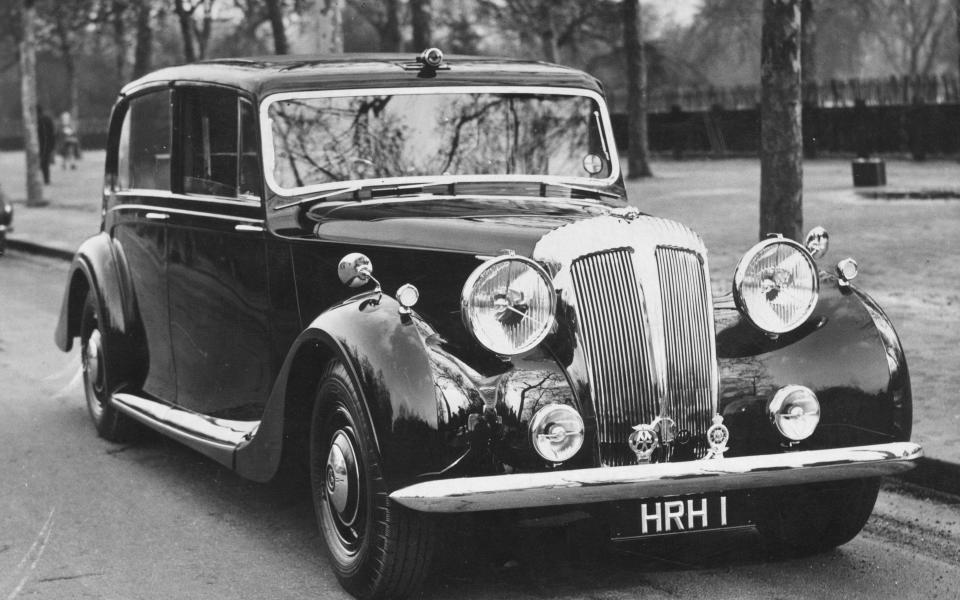
1954: Lagonda 3-litre Drophead Coupé
Prince Philip drove an open-top MG TC sports car when he wooed the future monarch. After the Coronation, he upgraded to an open-roof Lagonda, one of only 20 MkI examples fitted with an electric hood – a real novelty in those days.
It was the car that earned Aston Martin Lagonda its first Royal Warrant, too.
Prince Philip loved innovation, and the Edinburgh Green four-seater also featured a radio telephone. This allowed him to speak to Buckingham Palace using a unique Admiralty frequency, via a Pye relay station in the Hampstead hills. The Queen had an extra vanity mirror above the passenger seat.
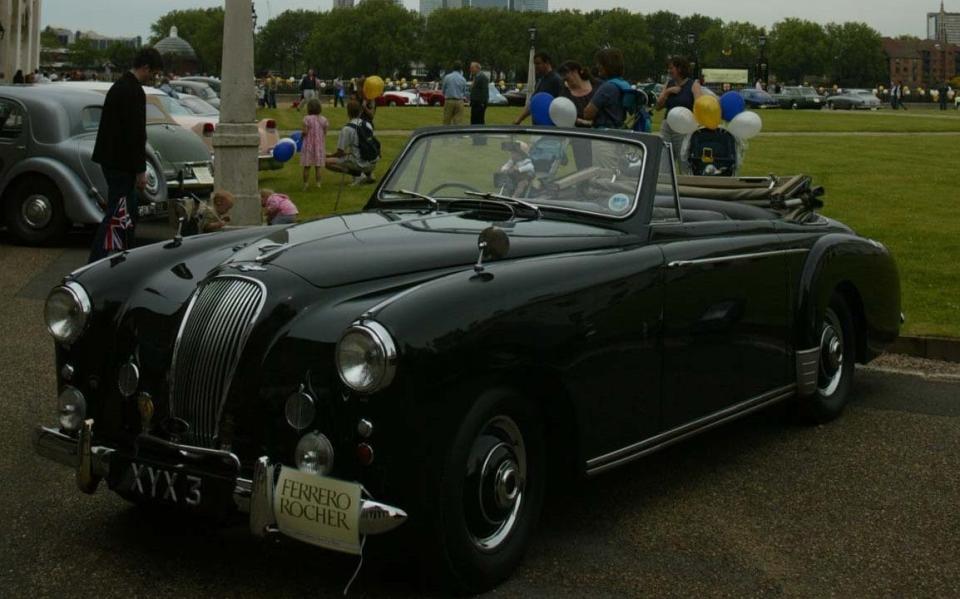
The 104mph car was used by the royal couple to officially open the M1 motorway in 1959.
1955: Rolls-Royce Phantom IV State Landaulette
With unique coachwork, again by Hooper, this ever-so-regal state car was completed in Rolls-Royce’s golden jubilee year. The company’s first eight-cylinder production model, the 5.7-litre straight-eight was retained at the Royal Mews from 1959 until 2002.
Only 18 examples were made, chassis number 4BP5 having special heating and ventilation, plus a security radio incorporating exterior speakers and an underbody aerial. As well as a roof-mounting point for the Royal Standard, a Perspex panel above the rear let extra light into the cabin.
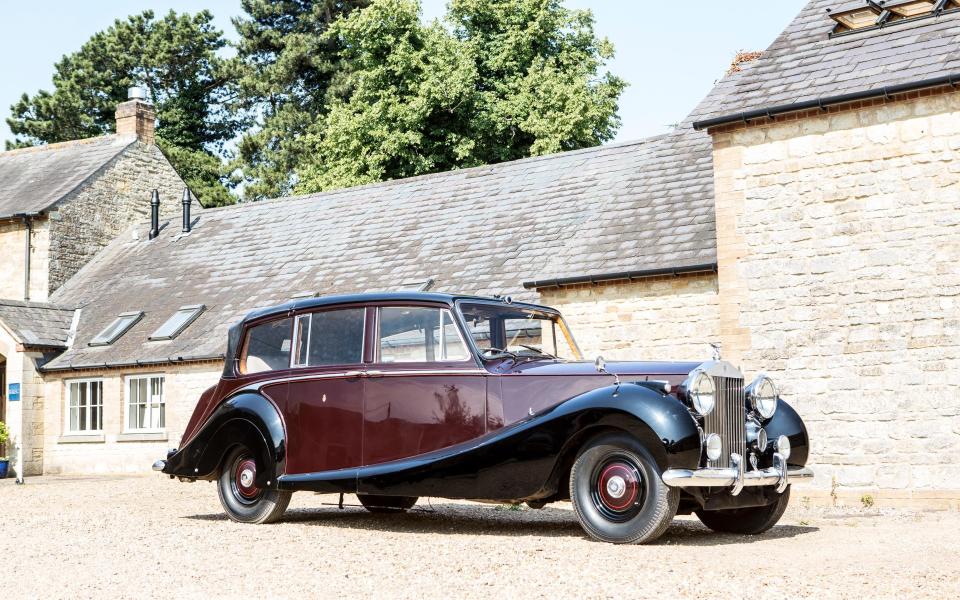
A landaulette body offers a rear passenger area with a section of convertible roof and was once popular with heads of state. The Queen’s claret and black car was complemented by dark blue and grey cloth upholstery.
1956: Ford Zephyr Estate
With a young, growing family, the ever-practical Queen needed a royal estate of a different kind. The SUV hadn’t been invented, so she took delivery of a modest Ford Zephyr which featured a huge load area as well as a raised roofline for extra comfort.
The popular Zephyr had been restyled in 1956, with wood trim and lashings of chrome. It cost £871 new.
A six-cylinder engine ensured the Zephyr was capable of more than 80mph, while the royal version could also carry nine people in a specially designed, fake wood-panelled estate body.
1960: Rolls-Royce Phantom V State Limousine
Perhaps the quintessential British limousine, the Phantom V attracted an eclectic list of owners, from the Shah of Iran to Elvis Presley and John Lennon – the latter decorating his with psychedelic motifs.
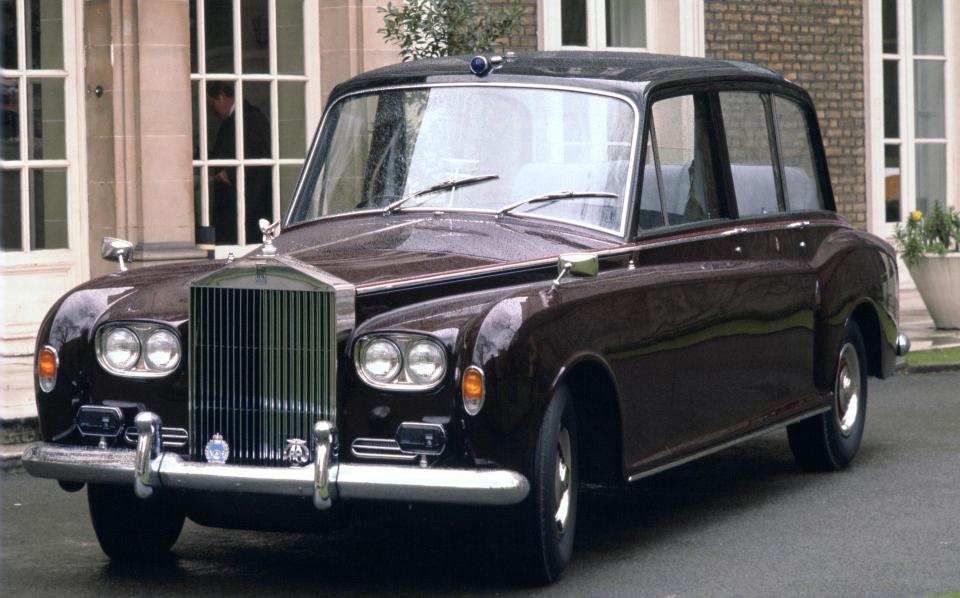
Nothing so vulgar for Her Majesty, who purchased two examples to join her existing fleet of Phantom IV state cars in 1960 and 1961. Both saw active service until the new millennium and one is on display at the Transport Museum on the Sandringham Estate. When used by the Queen, her personal silver mascot of St George and the Dragon was placed on the bonnet instead of Rolls-Royce’s usual Spirit of Ecstasy motif.
1961: Vauxhall Cresta PA Friary Estate
The Queen switched allegiances in the early 1960s and opted for a roomy Vauxhall estate with added lifestyle, instead of a car from American-owned Ford.
In addition to a rather ungainly estate conversion carried out by Friary Motors of Basingstoke, country pursuit modifications included a dog guard for the corgis, a gun rack for pheasant shoots and a fishing rod holder built into the roof.
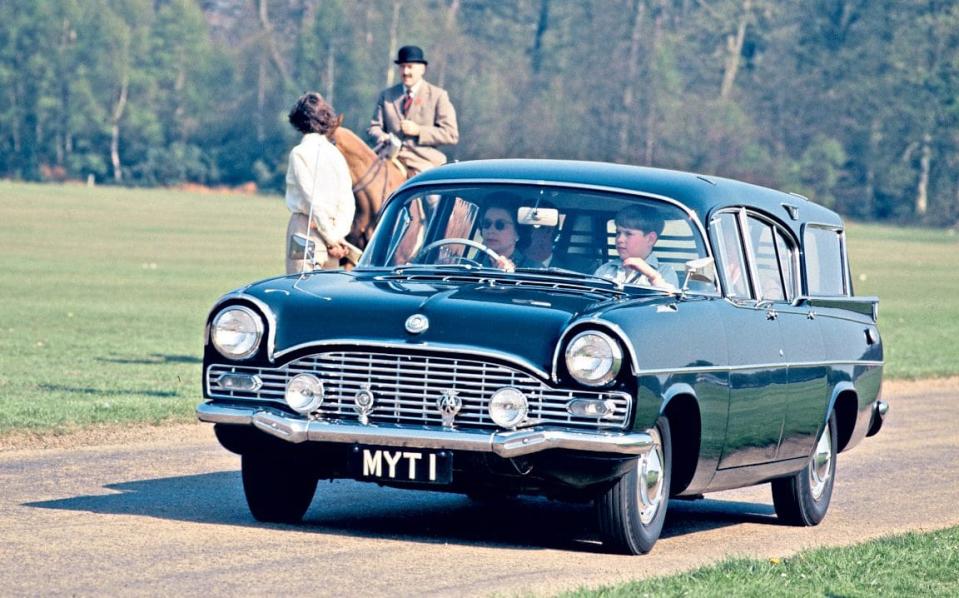
The Imperial Green PA was powered by a 2,262cc engine and was her first association with the brand, which later included other models such as the Viceroy and FE Victor 3300 estates.
Perhaps the most unusual Vauxhall/Bedford kept at the Royal Mews was an electric-powered CF personnel van, which forward-thinking Prince Philip often chose for engagements in London.
1963: Rover 3-litre saloon & 1971 Rover 3.5-litre P5B
The Queen Mother and the Queen were both Rover enthusiasts – as were many prime ministers, such as Ted Heath and Harold Wilson.
All were accustomed to being chauffeur-driven around the capital, but despite having a fleet of limousines at her disposal, the Queen also liked to drive herself in a Rover.
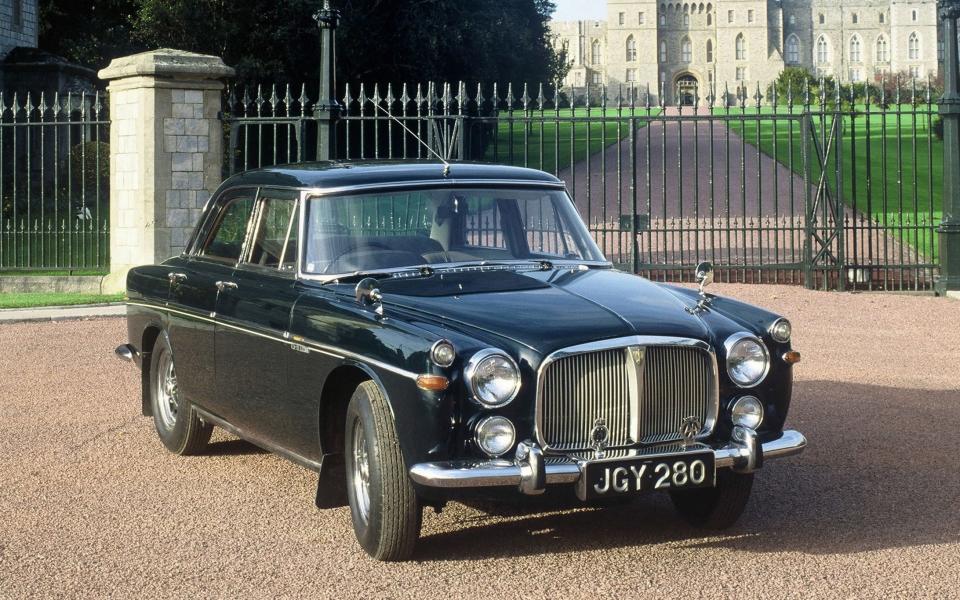
Although Rovers were derided as the poor man’s Rolls-Royce, the sumptuous interior was swathed in enough leather and dark wood veneers to give these saloons a dignified air.
Her Majesty’s 1971 P5B (above) is on display at the Heritage Motor Centre at Gaydon, equipped with a radio-telephone and a discreet blue tint to the windscreen, a precursor to modern privacy glass.
1967: Vauxhall Cresta PC
The Cresta PC was more advanced than the PA. Launched at the London Motor Show in 1965, the 3.3-litre model boasted enough performance and features for Car magazine to write at the time that it was “a good, honest, safe car”.
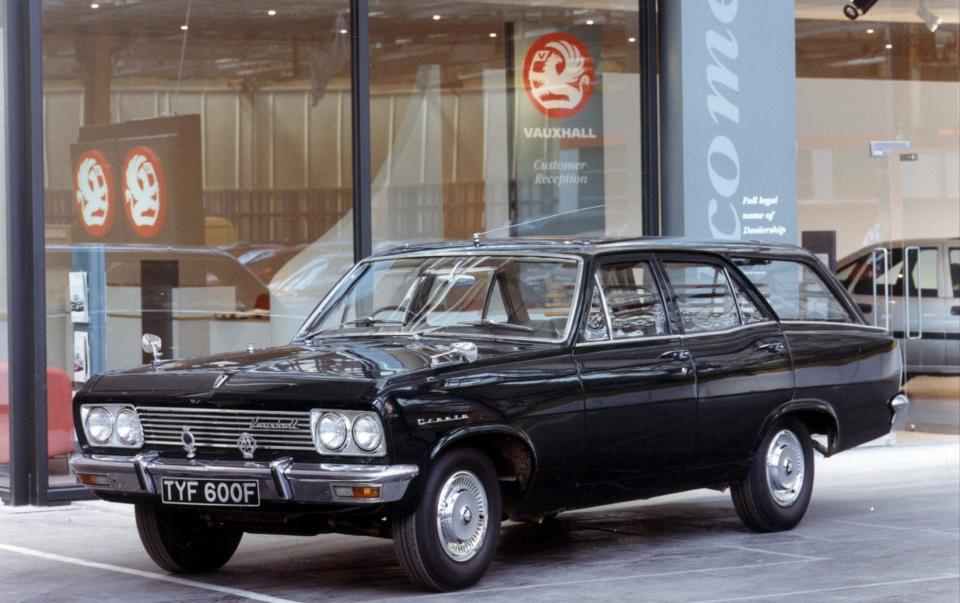
PC estate versions were built by Martin Walker Ltd of Folkestone but officially recognised by Vauxhall as factory-approved. Designed for a country lifestyle, the conversion cost £430 extra and was based on the De Luxe saloon, with royal passengers benefitting from a heater and cigarette lighter as standard.
1978: Land Rover Series III
Naturally, nobody complained if the Queen was a backseat driver – in fact, sometimes it was expected. The monarch’s 1978 Land Rover Series III connected her open-top passenger compartment at the rear to the chauffeur using a traffic-light system.
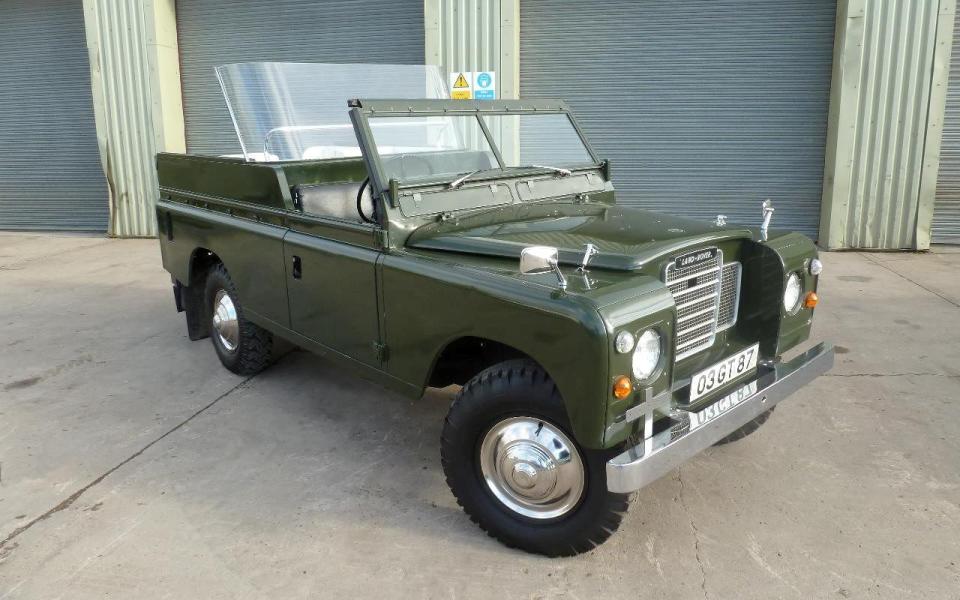
Brilliantly effective, the lights alerted the driver when to slow or stop. One imagines Prince Philip had a say in the design, which also included white leather seats.
When it was sold in 2012, the Land Rover had covered fewer than 2,000 slow-moving miles.
1984: Daimler Double Six LWB
Jaguar’s all-alloy V12 engine first appeared in the iconic E-Type sports car and then later in the more majestic XJ saloon. Daimler’s upmarket equivalent of that Jaguar was the Double Six, using the same 5.2-litre, 272bhp engine to great effect.
The Queen took delivery of a Double Six in October 1984 to serve as her personal car. The understated limo was painted in a bespoke hue called Gavin Green, trimmed with a unique doe-skin interior. A full-length cushion was also installed in the rear – simply for the comfort of HM’s three corgis.
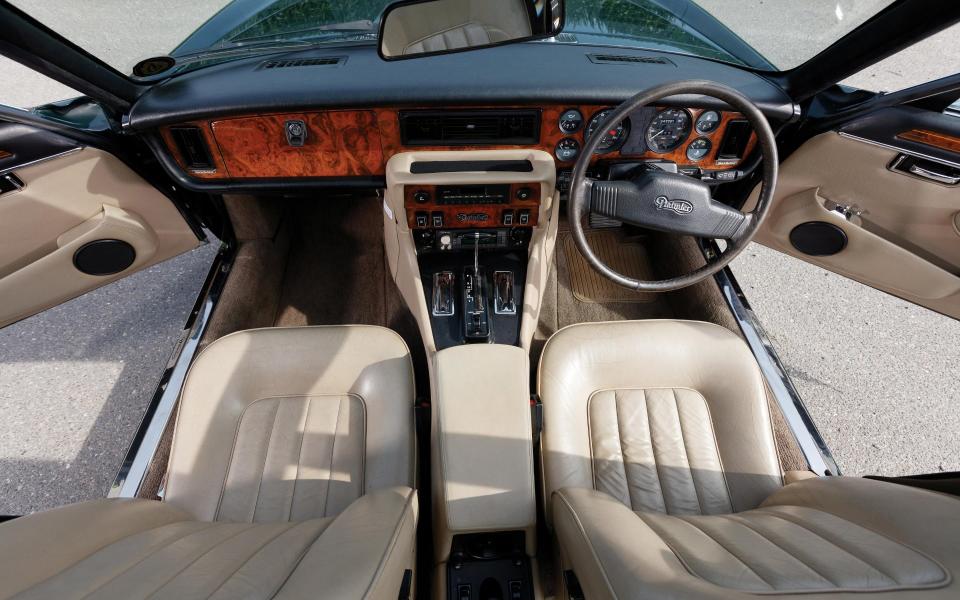
With a top speed of 135mph, the Queen could waft along in considerable luxury. Perhaps wisely, the long-wheelbase model was extensively tested by Jaguar engineers for several thousand miles to iron out any issues before its delivery to Buckingham Palace.
2001: Daimler V8 Super Saloon LWB
This long-wheelbase saloon in British Racing Green was the Queen’s personal transport for three years, covering 11,000 miles.
Among the modifications was an armrest with a sliding holder, designed to carry Her Majesty’s particular style of handbag.
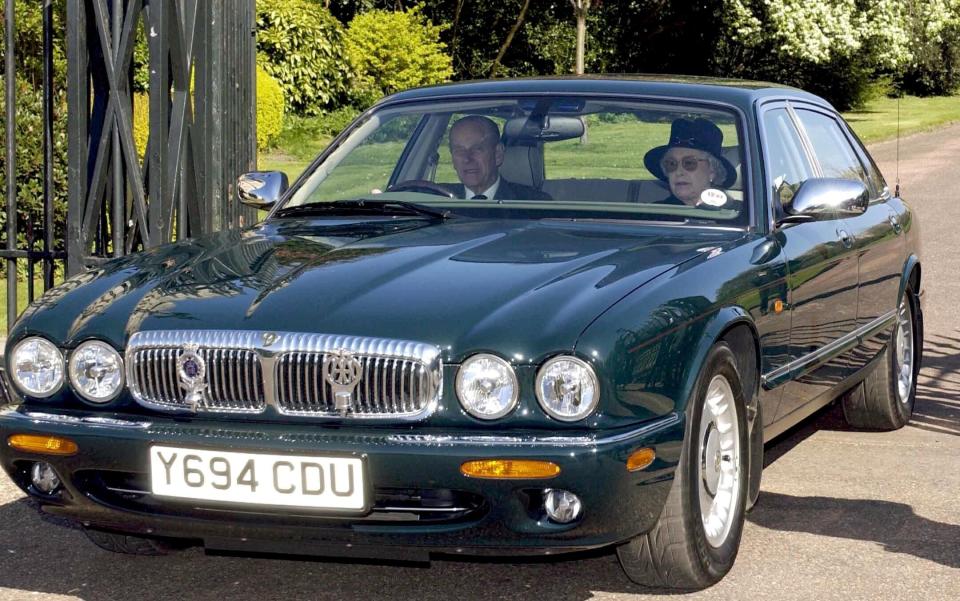
And while the Queen enjoys fresh air in the rear of a car, she apparently does not like a breeze directly on her face. Jaguar added extra window-lift switches so the opposite rear window could be opened without her having to reach across.
2002: Bentley State Limousine
Bentley presented the Queen with two official state cars celebrating her Golden Jubilee. The twin-turbo V8s are heavily modified vehicles based on the old Arnage limousine but with a much higher roofline.
Armoured glass and body panels protect the occupants, with tyres cut from tough Kevlar, while the cabin can be sealed off to withstand a gas attack.
Both examples remain in regular use to this day.
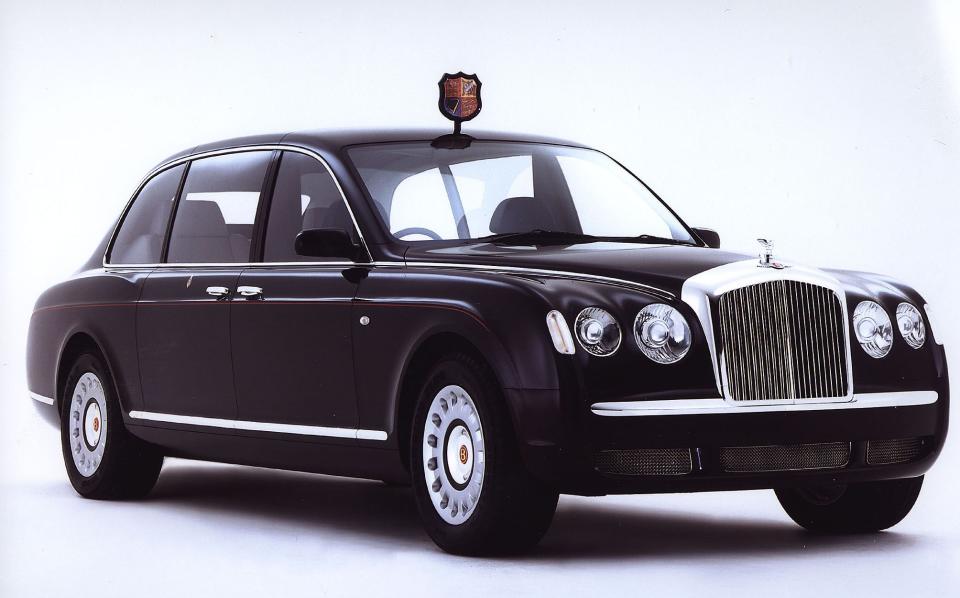
Land Rover Defender 110
A custom-built 2002 Defender is believed to have been one of HM’s favourites.
A long-wheelbase 110 with a 4.2-litre V8 engine, this Land Rover was designed for shooting parties, with a green leather interior, slightly raised suspension for extra ground clearance, plus a heated driver’s seat for the royal derriere.
When it was eventually auctioned for a remarkably modest £30,240 in 2014, shotgun cartridges and a shooting map were found in the glovebox.
2009: Jaguar X-Type Sovereign Estate
It must have been impossible to resist a car named after one’s position as head of state. This X-Type was top of the range, with parking sensors, heated seats and a dog guard to keep the corgis at bay.
The V6 was mainly used to drive around Windsor, clocking up only 7,600 miles before it was sold in 2016. The buyer paid £15,000 but at the time was unaware of the car’s royal pedigree.
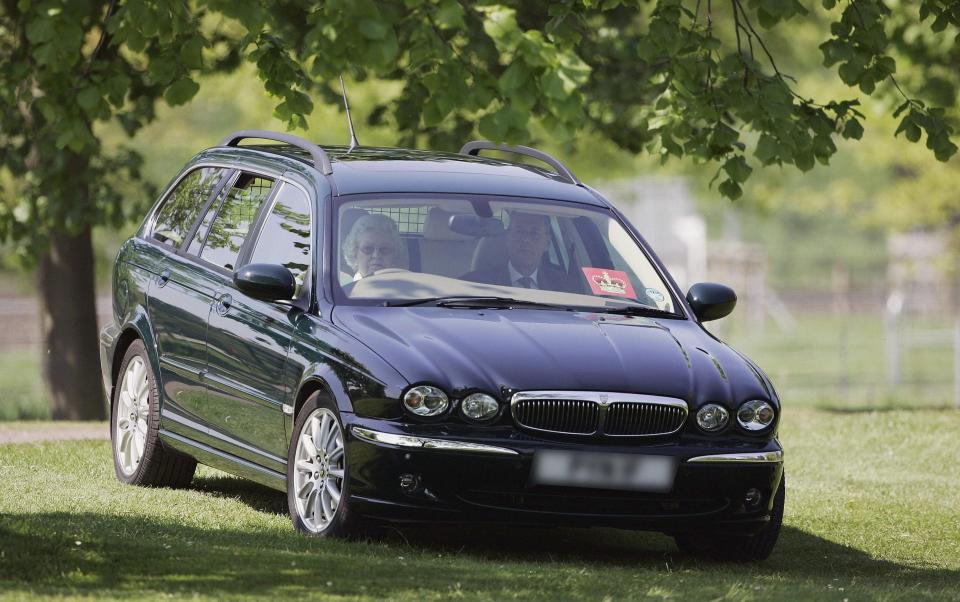
2015: Range Rover LWB Hybrid
The Queen has driven every type of Range Rover since the luxury off-roader was launched in 1970. The premium SUV is a favourite with most branches of the Royal family, as well as the security detail.
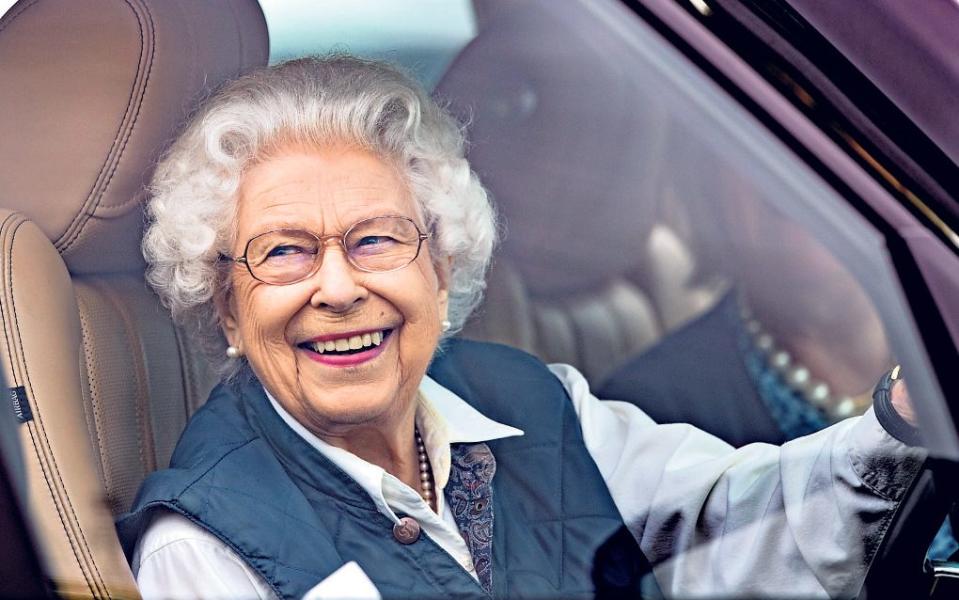
Her long-wheelbase landaulette is an open-top version with a raised platform allowing her to be seen more clearly. Her Range Rover is also a more environmentally friendly Hybrid model; a battery-only version of the all-new model will arrive in 2025.
2017: Bentley Bentayga
Bentley muscled in to the luxury SUV sector with the all-wheel-drive Bentayga, seemingly to put Land Rover’s nose out of joint.
And in a major PR coup, the first person to take delivery was none other than Her Majesty, enjoying new heights of arm-waving luxury from the rear seat.
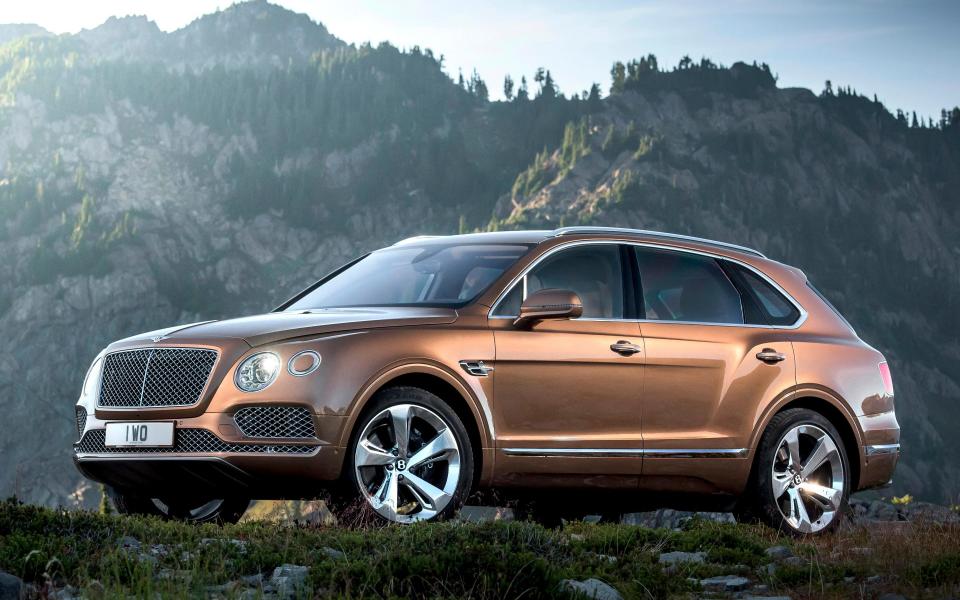
Back then, the Bentayga was the fastest SUV in the world; now it faces stiff competition from the raucous Lamborghini Urus – fortunately a model no British monarch is expected to be seen in any time soon.

 Yahoo News
Yahoo News 
